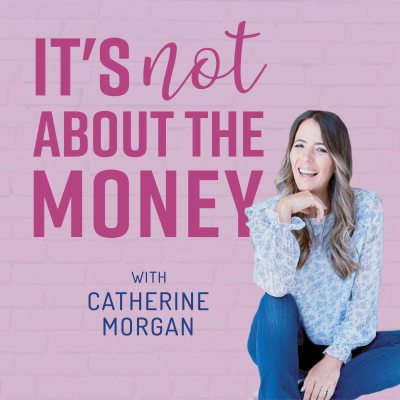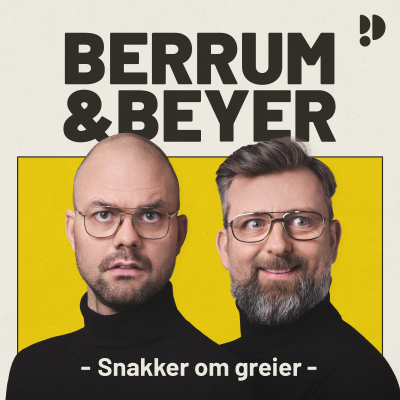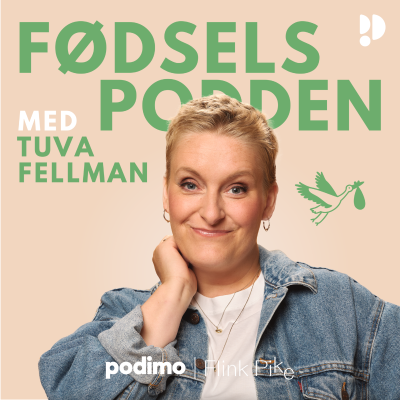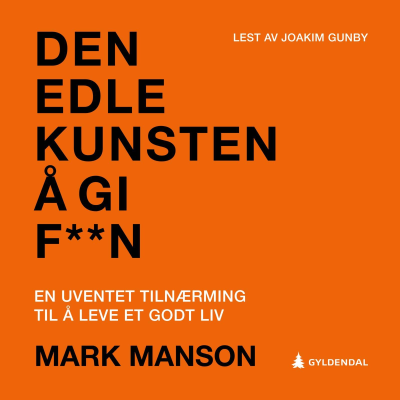
It's Not About The Money
Podkast av Catherine Morgan
It’s not about the money is for women in business who know they want to make more money whilst holding onto more money and growing an abundance of wealth. You're tired of overgiving, undercharging and being stuck in a scarcity money mindset. You know you have it in you, you just need financial confidence and an abundant mindset. You're excited and ready to learn what it takes to make more money, invest and step into wealth. Hosted by Catherine Morgan, Author, Award-winning Financial Wellbeing Speaker, Financial Coach and Trauma-informed coach. You'll learn the steps to create more wealth, grow your business, and have a better relationship with money. This is the show for you to feel good with money and to explore the meaning beyond wealth. This podcast is the one to listen to if you're a female entrepreneur. ‘Formerly the In Her Financial Shoes Podcast.’
Tidsbegrenset tilbud
3 Måneder for 9,00 kr
Deretter 99,00 kr / MånedAvslutt når som helst.
Alle episoder
342 EpisoderIn this vulnerable episode, I share the untold story behind hitting £50,000 months and how success nearly broke me mentally, emotionally, and physically. Rather than celebrating these income milestones, I reveal the shame, overwhelm, and toxicity that comes with scaling without boundaries - and the complete business transformation that saved my sanity. The Moment That Changed Everything - Summer 2023 * How my mum discovering my £50K bank statement triggered intense money shame * The guilt of making money "easily" when others, including my mum, had to struggle * My immediate response: dismissing it as a "one-off" rather than owning my success * The realisation that my nervous system was rejecting wealth because it felt dangerous to have more than people I love The Reality Behind the Success - What Nobody Talks About * Running 15 different courses and offerings simultaneously: mini courses, evergreen programmes, books, podcast, workshops, membership, certification, mastermind, pensions course, investing course, budgeting course * The overwhelming complexity of multiple revenue streams running at once * How my two biggest profit generators (12-month mastermind and signature money programme) required constant client acquisition * The crushing responsibility of paying team wages on top of my own income The Neurodivergent Entrepreneur's Dilemma * How my 2023 ADHD diagnosis explained my love of creating and my overwhelm with complexity * The creativity trap: what was joyful and easy became my kryptonite * Why neurodivergent brains struggle with "more" - the million pieces of information running simultaneously * The toxic scaling trap fuelled by online business gurus pushing "make more, hire bigger teams, create more products" My Great Simplification Journey - What I Actually Did * Taking August 2024 completely off (with a separate episode on how to do this) * Pausing my podcast for five months - the first break in five years * Closing my mastermind (biggest income generator) and stopping launches for my second biggest programme * Letting go of a key team member and hibernating whilst travelling Canada with my family * The breakthrough conversation with Richard Branson on Necker Island about his circle analogy The Rule of Five Framework for Overwhelmed Entrepreneurs 1. One target market - you can't serve everybody without serving nobody 2. One problem solved - going deep rather than wide, partnering with others for different solutions 3. One offer - mastering one thing completely rather than multiple offerings 4. One platform - I chose LinkedIn and became top 30 money content creator in UK within 90 days 5. One year - committing to this focus for 12 months without wavering My Personal Implementation Story * Returning to my core: financial coach training for professionals wanting to help clients with money * Focusing on my Money Narrative Clearing Framework as the one thing with biggest impact * Investing in LinkedIn mastery course and achieving top 30 UK money creator status * Four speaking opportunities in 90 days, including one at the O2 * Stripping back to part-time PA and couple of VAs only The Financial Permission I Gave Myself * Living off investments and savings for a year to remove financial pressure * Paying myself from savings pots rather than staying in constant launch mode * Overcoming stories about "wealth experts should be making loads of money consistently" * Understanding my numerology: coming out of year 9 (completions/letting go) into year 1 (new beginnings) and now year 11 (spiritual teacher/volatile emotions) The Success Lessons Nobody Teaches You Success Can Be Lonely: * How entrepreneurship isolates you from meaningful connections * Making 2025 my "year of relationships" - every decision based on improving relationships with self, others, and business collaborations Success Trauma Is Real: * How your nervous system can interpret success as danger * Generational money patterns affecting permission to hold wealth * The need to heal success trauma before scaling Complexity Is the Enemy of Clarity: * More offers don't equal more money - confused minds don't buy * Confused CEOs don't lead well * The power of saying "not right now" to ideas and opportunities Creativity Needs Boundaries: * Visionaries need creative outlets outside their business * The danger of relying solely on business for fulfilment and joy * What happens when you want to sell or retire - preparation for life beyond business Neurodivergent Entrepreneurs Have Different Rules: * Traditional business models can be harmful to neurodivergent brains * Building business around family priorities and personal energy patterns * Working 9-3, no evening webinars, extended wind-down time for nervous system regulation Where I Am Now - The Results of Simplification * Significantly more space in my calendar and less stress * Lower revenue but exponentially more joy and fulfilment * Two focused businesses: UK financial coach training, Jersey personal brand with one container (Energy of Selling mini-mastermind) * Smaller, happier, more focused team with better time freedom * Dramatically improved mental health and expanded relationships * Recognition that wealth is built on focus, not complexity Practical Action Steps for Overwhelmed Entrepreneurs 1. Audit your offerings - what can you cut that's not bringing joy or revenue? 2. Check your nervous system - is success feeling safe? Address money stories holding you back 3. Apply the Rule of Five - where can you simplify across all five areas? 4. Honour your neurodivergence - what actually works for your brain and energy? Redefine success - give yourself permission to prioritise wellbeing over revenue Final Thought This episode emphasises that real wealth isn't just about the money you make - it's about the life you get to live whilst making it. If your success is costing you your sanity, it's time to redefine what success looks like and feels like. My £50K months didn't make me happier; they just made me busier. Chapters 00:00 - Introduction: The Reality of Financial Milestones 03:30 - The Shame of Success 08:00 - The Toxicity of Scaling 14:00 - The Great Simplification 20:00 - The Rule of Five Framework 26:00 - Honoring Neurodivergent Needs 32:00 - Redefining Success Resources: Get my FREE book [https://www.itsnotaboutthemoney.co.uk/free-book] 'It's Not About The Money' Take the Money StoryTypes® Quiz [https://www.catherinemorgan.com/money] Sign up to my FREE Newsletter [https://themoneypanel.co.uk/newsletter/] Become a Certified Financial Coach [https://themoneypanel.co.uk/financial-coach-certification/] Join The Energy of Selling [http://www.catherinemorgan.com/eos] Discover the the Linkedin Accelerator course [https://www.thecreatoracademy.com/checkout/creator-accelerator-4?affiliate_code=d81929] I did Listen to What I learnt from Sir Richard Branson [https://catherinemorgan.com/podcastarchive/how-my-adhd-diagnosis-shifted-my-identity/]
In this episode, I explore why we get stuck repeating the same frustrating money patterns despite reading books, listening to podcasts, and working on our mindset. Rather than blaming ourselves for being broken or lazy, I reveal the hidden psychology behind these behaviours - the secondary gains that keep us "stuck" because they're actually protecting us in some way. Episode Highlights: Understanding Secondary Gains - The Hidden Benefits * How every financial behaviour, even destructive ones, serves a positive purpose * Why our unconscious mind creates patterns to keep us safe based on old information * The concept of secondary gains as "wrapping" around our biggest fears about money * How protection mechanisms that once served us may no longer be appropriate at 43 * The difference between conscious desires and unconscious protective patterns My Personal Examples: Undercharging and Protection * How I stayed in undercharging patterns to avoid rejection and confrontation * The realisation that "you're too expensive" is about the other person's values, not my worth * My Thermomix story - how I value different things differently (£800 kitchen gadget vs. high-ticket mentoring) * The first-class flight dilemma and the guilt around spending £1,500 on comfort The Four Most Common Secondary Gains Around Money 1. Undercharging Pattern: * Primary fear: rejection, confrontation, and loss of "nice person" identity * Benefits: more people say yes, avoiding uncomfortable negotiations, staying accessible * How it prevents claiming full power and owning your brilliance * Applies to both business owners and employees negotiating pay rises 2. Chronic Saving Pattern: * Primary fear: uncertainty and lack of control * Benefits: feeling protected, being the "responsible one," avoiding buyer's remorse * How it maintains identity as the sensible person while others are "frivolous" * The trap of "never enough" despite growing bank balances 3. Money Avoidance Pattern: * Primary fear: adult responsibility and making wrong decisions * Benefits: maintaining childlike innocence, having others take responsibility * How chaos becomes an excuse to avoid goal-setting and risk-taking * Case study from my recent live coaching demonstration about staying in childlike patterns 4. Overspending/Impulse Pattern: * Primary fear: making big decisions and planning ahead * Benefits: instant emotional regulation, dopamine hits, maintaining victim identity * How it helps avoid future planning (especially challenging for neurodivergent brains) * My personal pattern of spending everything to avoid making financial decisions The Identity and Relationship Dynamics * How money patterns serve our relationships and keep peace * Client examples: fear of out-earning mentors, maintaining marriage dynamics * The "struggling artist" or "survivor" story identity * How staying financially small can protect us from jealousy and judgment * The secondary gain of maintaining harmony by not threatening others' positions Spotting Your Own Secondary Gains - Key Questions * What do you get to avoid when you stay stuck? * What identity does this pattern allow you to maintain? * How do your money patterns serve your relationships? * What would you have to face if this pattern disappeared tomorrow? * Does the possibility of change feel scary, and why? Working With Secondary Gains, Not Against Them * The importance of curiosity over judgment * How these patterns developed for good reasons and have been trying to protect us * My approach using Emotional Freedom Technique (EFT) and Matrix Re-imprinting * Combining somatic work with inherited family trauma modalities * The goal: making your financial future more exciting than the secondary gain Practical Steps for Change * Honouring what the pattern has done for you with gratitude * Speaking directly to the protective parts: "Thank you for keeping me safe" * Working with the nervous system through gradual, sustainable changes * Finding healthy ways to meet the same emotional needs differently * Why incremental price increases work better than dramatic jumps The Neurodivergent Perspective * How ADHD and autism traits can make planning ahead feel unsafe * Why spending everything now avoids future decision-making pressure * Reference to previous episodes on managing money with ADHD * protective mechanisms Chapters 00:00 Understanding Money Patterns and Secondary Gains 09:52 The Impact of Undercharging and Self-Worth 18:33 Exploring Chronic Saving and Money Avoidance 26:03 Transforming Patterns and Embracing Change Resources: Get my FREE book [https://www.itsnotaboutthemoney.co.uk/free-book] 'It's Not About The Money' Take the Money StoryTypes® Quiz [https://www.catherinemorgan.com/money] Sign up to my FREE Newsletter [https://themoneypanel.co.uk/newsletter/] Become a Certified Financial Coach [https://themoneypanel.co.uk/financial-coach-certification/] Get Investing [https://catherinemorgan.com/get-investing-course/] with my course - Use code INVEST50OFF2024 for 50% off as a podcast listener. Discover how to manage money when you have ADHD - watch a Live Money Clearing Financial Coaching demo video [https://youtu.be/40328sJWRfU?si=61Rq6AQNH8e3CuE7]
My Personal Financial Adviser Paradox * How I spent years giving brilliant financial advice whilst being unable to follow it myself * Why excess money never felt safe to hold - everything above day-to-day needs felt dangerous * The realisation that it wasn't about willpower, knowledge, or self-control * How inherited beliefs about money scarcity and "dirty money" from family arguments shaped my nervous system responses Understanding Borrowed Beliefs - The Father Christmas Analogy * Borrowed beliefs as gifts in Father Christmas's sack - given with love but not all serving us today * How these beliefs often hold secondary gains and serve us in some way (usually safety) * The importance of returning unused "gifts" with love and gratitude to break generational patterns * Why changing our money relationship impacts every future generation Where Inherited Money Scripts Come From * Family dynamics and early childhood experiences (my Warwick Castle story about my brother losing £20) * Religious and cultural influences on money beliefs * Specific historical events our families lived through * Personal money experiences that create lasting impressions * The crucial question: "In my family, money was..." The Three Predictable Patterns of Borrowed Beliefs Low Receiving Pattern: * Difficulty allowing money, opportunities, or compliments to come in * Common beliefs: "Rich people are greedy," "Money corrupts people," "I don't deserve money" * Shows up as: undercharging, deflecting compliments, turning down opportunities, feeling guilty about success * My personal example of struggling with praise and awards Low Holding Pattern: * Brilliant at making money but terrible at keeping it * Common beliefs: "Money disappears anyway," "Something bad happens when I have too much" * Shows up as: impulsive spending after earning well, self-sabotage when successful, anxiety about bank balances * Case study of my student hitting six-figure months then immediately booking lavish holidays Low Giving Pattern: * Fear-based hoarding rather than conscious saving * Common beliefs: "I can't afford to be generous," "If I give, there won't be enough for me" * Shows up as: difficulty investing in yourself, anxiety about spending on others, perpetual "rainy day" saving The Family Money Tree Exercise * How to map out your family's money patterns across generations * Questions to explore: Was money talked about openly? Was it a source of arguments? Who controlled money? * Common inherited phrases and their impacts: * "Money doesn't grow on trees" = scarcity programming * "Money's the root of all evil" = spiritual guilt around wealth * "We can't afford it" = limitation mindset * "Money doesn't buy happiness" = pacifist money story The Generational and Cultural Context * How survival strategies from the Great Depression or wartime still influence us today * Different cultural approaches to wealth - celebration vs. modesty * Gender dynamics between maternal and paternal money influences * The historical context that made these beliefs necessary for survival Conscious Choice and Legacy Work * Recognising which beliefs served our families but no longer serve us * The power shift from unconscious inheritance to conscious choice * How this work creates transformation for coaches, therapists, and financial professionals * The ripple effect of changing generational money patterns Final Thought This episode emphasises that changing our relationship with money isn't just personal work - it's legacy work that impacts every future generation. When we consciously choose which inherited beliefs to keep and which to lovingly release, we're not just transforming our own financial reality, we're changing the money story for generations to come. Chapters 00:00 Introduction to Money Beliefs 02:10 The Impact of Family Money Stories 05:25 Understanding Borrowed Beliefs 08:32 Identifying Personal Money Experiences 11:57 The Blueprint of Money in Families 17:00 Patterns of Money Behavior 22:24 Mapping Your Money Tree 29:44 Choosing New Money Beliefs Resources: Get my FREE book [https://www.itsnotaboutthemoney.co.uk/free-book] 'It's Not About The Money' Take the Money StoryTypes® Quiz [https://www.catherinemorgan.com/money] Sign up to my FREE Newsletter [https://themoneypanel.co.uk/newsletter/] Become a Certified Financial Coach [https://themoneypanel.co.uk/financial-coach-certification/] Get Investing [https://catherinemorgan.com/get-investing-course/] with my course - Use code INVEST50OFF2024 for 50% off as a podcast listener. Listen to the previous podcast episode - The Future Of Money and AI With Natalie MacNeil [https://catherinemorgan.com/podcastarchive/the-future-of-money-and-ai-with-natalie-macneil/] Listen to the previous podcast episode - How Digital Currency Is Rewiring Our Money Mindset [https://catherinemorgan.com/podcastarchive/how-digital-currency-is-rewiring-our-money-mindset/]
In this episode, I share insights from my recent interview with UK-based global company Agon about the crucial link between mental health and money. Rather than offering quick fixes, I explore the deeper emotional landscape beneath financial anxiety and provide six key questions to help you understand what's really driving your money worries Episode Highlights: Understanding the Root of Money Worries * Money itself isn't usually what we're worried about - it's what money represents * Common underlying fears: relationship security, business stability, lifestyle changes, and team obligations * How financial anxiety often stems from deeper meanings we attach to money * The difference between surface-level money concerns and their emotional foundations The Emotional Spectrum of Money * My ladder metaphor: low-vibrational emotions at the bottom (shame, guilt, stress, anger) vs high-vibrational emotions at the top (gratitude, joy, happiness) * Why jumping straight to gratitude practices doesn't work when you're experiencing financial shame * The crucial middle step: acceptance of past decisions, inherited beliefs, and trauma patterns * How the nervous system creates fight-or-flight responses to protect us from perceived financial threats The Complexity of Money Shame * Why shame is the hardest emotion on the spectrum to shift * How shame creates a freeze response in the nervous system, leading to financial avoidance * Recognising shame through language: the "shoulds" we place on ourselves ("I should be good with money," "I should be further ahead") * The importance of compassionate acknowledgement without judgement Money and Neurodiversity * How traditional financial advice assumes neurotypical learning styles * Specific challenges for neurodivergent individuals: impulse control, budgeting, long-term planning * My personal ADHD experience: visual presentations, movement during money conversations, shorter but more frequent meetings * The correlation between depression, anxiety, and financial avoidance Beyond Traditional Financial Solutions * Why practical solutions (budgets, investment plans) don't work without addressing underlying emotions * The problem with control-based planning when control doesn't feel safe * How impulsive spending patterns can sabotage investment strategies if safety concerns aren't addressed * The importance of understanding emotional patterns before implementing financial tools Professional Development for Coaches * How coaches can support clients with money conversations without being qualified financial advisers * The power of holding space for psychological exploration around money decisions * Tools and frameworks for understanding the patterns behind financial behaviours * My financial coach certification programme and free 40-minute training Final Thought This episode emphasises that healing our relationship with money requires understanding the emotional spectrum beneath our financial behaviours. Rather than bypassing difficult emotions to reach gratitude and joy, lasting change comes through accepting where we are, understanding our protective patterns, and working with our individual psychological makeup. Chapters 00:00 Understanding Money Worries and Emotions 06:11 The Emotional Spectrum of Money 12:43 Navigating Mental Health and Money Conversations Resources: Get my FREE book [https://www.itsnotaboutthemoney.co.uk/free-book] 'It's Not About The Money' Take the Money StoryTypes® Quiz [https://www.catherinemorgan.com/money] Sign up to my FREE Newsletter [https://themoneypanel.co.uk/newsletter/] Come to our Wealth Awakening Retreat [https://catherinemorgan.com/wealth-awakening-retreat/] Become a Certified Financial Coach [https://themoneypanel.co.uk/financial-coach-certification/] Get Investing [https://catherinemorgan.com/get-investing-course/] with my course - Use code INVEST50OFF2024 for 50% off as a podcast listener. Watch the FREE masterclass here [https://themoneypanel.co.uk/3-hidden-money-narratives-masterclass/#training-form] Listen to The best way to plan your finances if you have adult ADHD [https://catherinemorgan.com/podcastarchive/the-best-way-to-plan-your-finances-if-you-have-adult-adhd/] Listen to How to Manage Money in Business When You Have ADHD [https://catherinemorgan.com/podcastarchive/how-to-manage-money-in-business-when-you-have-adhd/] Listen to (Money StoryTypes®) Money Shame & Emotional Spending [https://catherinemorgan.com/podcastarchive/money-storytypes-money-shame-emotional-spending/] listen to my 1 Way To Overcome Money Shame [https://catherinemorgan.com/podcastarchive/1-way-to-overcome-money-shame/]
Episode Overview In this follow-up episode to last week's conversation with Natalie MacNeil, I explore the psychological and emotional shifts required as we move into the digital currency era. Rather than focusing on technical aspects, this episode addresses the deeper questions about trust, safety, and completely rewiring how our brains think about money. Episode Highlights: The Physical vs Digital Money Mindset * Our brains are hardwired to equate real money with tangible things we can hold and count * Why Brits love property investing: it's "bricks and mortar" compared to US generations who prefer renting * Digital currencies ask us to place value in mathematics and community consensus rather than government * The challenge of trusting numbers on a screen that exist in cloud-based systems * How our nervous system was designed to equate safety with things we can physically control Understanding Digital Currencies Simply * Digital currencies as numbers stored on a huge shared computer network * Unlike bank account numbers controlled by one institution, these are verified by thousands of computers worldwide * Bitcoin as "digital gold" - limited in supply and designed to hold value * Ethereum as a digital platform for building applications and communities * The key difference: controlled by mathematics and community, not governments or banks The Generational Divide * Personal story of 11-year-old son naturally gravitating toward digital wallets * How younger generations view money as naturally existing "on a phone" * Older clients who still prefer printed bank statements * The comfort level with digital currencies often depends on how one grew up with technology The Great Trust Transfer * Examining where we've been placing our trust: banks as the "safe option" * The 2008 financial crisis and recent bank failures like Silicon Valley Bank * COVID money printing diluting the value of every pound in bank accounts * The psychological shift from "the bank will look after my money" to "I am my own bank" * Why trusting ourselves feels riskier than trusting institutions that have failed us The Pearl Analogy from Gene Keys * Richard Rudd's symbolism of the pearl as feminine metaphor for prosperity * How pearls form from pressure and irritation, not perfection * Wealth coming from responding with grace to challenges rather than ease * Digital currencies as the "pearl" - transforming financial friction into something beautiful * Moving from hoarding for ourselves to community and shared values Practical Steps for Building Confidence * Using AI to create personalised learning courses about digital currencies * Starting with 2-3% portfolio allocation to learn gradually * The challenge of getting advice from traditional financial advisors due to regulatory constraints * Beginning with small enough amounts to sleep at night but large enough to genuinely learn * Treating it like learning any new skill - expecting a gradual comfort-building process Educational Resources * Creating AI prompts to build beginner's guides tailored to individual situations * Recommendation for Natalie McNeil's AI Dream Team course for entrepreneurs * Catherine's book "It's Not About the Money" as foundational mindset work * The Get Investing Course for beginner investors with 50% discount code INVEST50OFF2024 Final Thought This transformation is about trust, not technology. We're living through one of the biggest shifts in how humans relate to money since moving away from the gold standard. The key is giving yourself permission to start learning gradually and allowing your nervous system time to adjust, just as it did with online banking. Chapters 00:00 Rewiring Our Money Mindset 04:21 Understanding Digital Currencies 10:03 Generational Perspectives on Money 11:59 Trust and Financial Institutions 15:19 The Pearl Analogy: Transformation in Wealth 21:30 Practical Steps for Building Confidence 28:19 Trust Over Technology: A New Approach Resources: Get my FREE book [https://www.itsnotaboutthemoney.co.uk/free-book] 'It's Not About The Money' Take the Money StoryTypes® Quiz [https://www.catherinemorgan.com/money] Sign up to my FREE Newsletter [https://themoneypanel.co.uk/newsletter/] Come to our Wealth Awakening Retreat [https://catherinemorgan.com/wealth-awakening-retreat/] Become a Certified Financial Coach [https://themoneypanel.co.uk/financial-coach-certification/] Discover how to screen your investment portfolio with an ethical lens [https://www.ethicalscreening.co.uk/] Explore the AI Dream Team Course [https://millscatherine--coachingevolved.thrivecart.com/ai-dream-team-accelerator/] (Please note we are an affiliate for this course which means we may earn an affiliate commission for any purchases) I have personally invested and completed this course to help me save hours of time in my business. Download your AI Prompt Playbook [https://millscatherine--coachingevolved.thrivecart.com/ai-dream-team/67acdc27756d0/] Sign up to Natalie’s Weekly Newsletter [https://millscatherine--coachingevolved.thrivecart.com/ai-dream-team/67acdc42756d1/] Listen to podcast episode: Understanding your deep resistance to success through the lens of Gene Keys [https://catherinemorgan.com/podcastarchive/fear-of-success-understanding-your-deep-resistance-to-success/] Get Investing [https://catherinemorgan.com/get-investing-course/] with my course - Use code INVEST50OFF2024 for 50% off as a podcast listener.
Tidsbegrenset tilbud
3 Måneder for 9,00 kr
Deretter 99,00 kr / MånedAvslutt når som helst.
Eksklusive podkaster
Uten reklame
Gratis podkaster
Lydbøker
20 timer i måneden

































